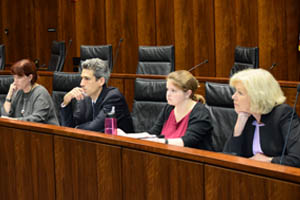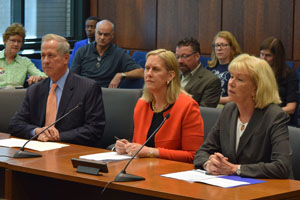- Details
- Category: Latest News
 CHICAGO - For families of individuals with disabilities in Illinois, the process of securing job training services, residential housing options or day programs can be an arduous process that can takes years.
CHICAGO - For families of individuals with disabilities in Illinois, the process of securing job training services, residential housing options or day programs can be an arduous process that can takes years.
“My son has been waiting for services since 2008,” said Mike Baker, parent and State Advocacy Chair of Autism Speaks.
Baker testified today about the importance of providing services for individuals with disabilities at a Senate Human Services Committee hearing held at the Bilandic Building in downtown Chicago.
- Details
- Category: Latest News
 Join Senator Julie Morrison, Representative Elaine Nekritz and Representative Scott Drury for a town hall on environmental issues, taking place on Wednesday, September 21 at 7 p.m. at the Chicago Botanic Garden.
Join Senator Julie Morrison, Representative Elaine Nekritz and Representative Scott Drury for a town hall on environmental issues, taking place on Wednesday, September 21 at 7 p.m. at the Chicago Botanic Garden.
Have a question or want to RSVP?
Please contact John Amdor in Rep. Nekrtiz's office at (847) 229-5499 or at
Click on the flyer for more information
- Details
- Category: Latest News
 Join Senator Julie Morrison, Division of Rehabilitation Services Bureau Chief Louis Hamer, representatives from Aspiritech and a host of other distinguished guests on Sept. 27 at Highland Park Country Club as they discuss employment opportunities for Illinoisans with disabilities.
Join Senator Julie Morrison, Division of Rehabilitation Services Bureau Chief Louis Hamer, representatives from Aspiritech and a host of other distinguished guests on Sept. 27 at Highland Park Country Club as they discuss employment opportunities for Illinoisans with disabilities.
Questions?
Contact Senator Morrison's office in Deerfield at (847) 945-5200.
Click on the flyer for more information
- Details
- Category: Latest News
 CHICAGO – Advocates in support of restoring the ability of Illinois municipalities to ban assault weapons testified in favor of a proposal introduced by State Senator Julie Morrison (D-Deerfield) at a Senate committee this morning in Chicago.
CHICAGO – Advocates in support of restoring the ability of Illinois municipalities to ban assault weapons testified in favor of a proposal introduced by State Senator Julie Morrison (D-Deerfield) at a Senate committee this morning in Chicago.
“Military-style weapons, designed for war and not for sport, have no use on our streets and in our neighborhoods,” Mark Walsh with the Illinois Council Against Handgun Violence said.
Morrison’s proposal, contained in Senate Bill 2130, restores Illinois municipalities’ right to ban assault weapons and high-capacity magazines. Current Illinois law prohibits municipalities from enacting assault weapon bans. The practice was legal until 2013, when the controversial law allowing Illinois residents to carry concealed weapons was passed.
More Articles …
Page 60 of 97





